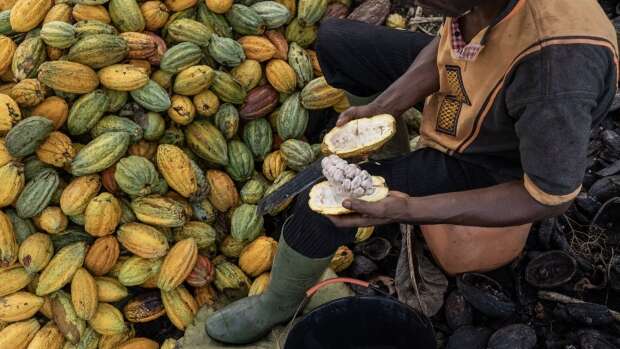Local Cocoa Buyers Face Collapse as COCOBOD Retreats from Syndicated Loans
Ghana’s state-run cocoa regulator has warned that indigenous cocoa buying firms face possible extinction following the withdrawal of a key financing mechanism that has historically underpinned the country’s cocoa trade.
Dr Randy Abbey, Acting Chief Executive of the Ghana Cocoa Board (COCOBOD), said the absence of a syndicated loan for the 2025/26 season—used to provide liquidity for Licensed Buying Companies (LBCs)—is severely disrupting domestic cocoa procurement.
“Something is happening with the LBCs, especially the indigenous ones, which has to do with the fact that we are not doing the syndicated loan,” Abbey said in an interview with Joy News on Thursday.
For decades, Ghana has relied on an annual pre-export syndicated facility, typically arranged with a consortium of international lenders, to pre-finance cocoa purchases from smallholder farmers. The proceeds are distributed to LBCs as seed capital, allowing them to buy beans during the harvest season.
However, COCOBOD opted to scale back the facility for the 2024/25 season and has no plans to secure one for 2025/26. Discussions around 2026/27 remain uncertain.
“But 2024/25, low syndicated loans, so no seed fund,” Abbey said. “Now the indigenous LBCs are unable to operate because there’s no seed money.”
The withdrawal of the syndicated loan comes as global cocoa prices have surged to multi-decade highs, propelled by tight supplies in Ghana and Côte d’Ivoire—the world’s top two producers. Despite the boom in prices, local LBCs are struggling to raise capital independently due to tightening credit conditions and elevated domestic interest rates.
According to Abbey, securing a new facility under current conditions would have required between GHS 3 billion and GHS 3.5 billion ($250mn–$290mn), with lenders demanding interest rates of up to 10% in dollars—costs COCOBOD considers unsustainable.
“Because of the nature of our finances, you even have banks asking for 8% to 10% on $1,” he said.
Instead, the regulator has shifted to a 60:40 model, under which 60% of financing is expected from cocoa buyers and 40% from COCOBOD’s internal resources. But the change has left many domestic buyers—particularly smaller, Ghanaian-owned firms—struggling to stay afloat.
In response, COCOBOD has approached the Bank of Ghana to seek alternative liquidity support for the sector. Abbey disclosed that a formal request has been made to repurpose a portion of the central bank’s Cash Reserve Ratio (CRR) to stabilise the cocoa value chain.
“What I then told the central bank when we engaged them was that, look, you have the Cash Reserve Ratio, where all the banks put 25% of their deposits at the central bank. This is idle, not doing anything,” he said.
He proposed that between 2% and 3% of the CRR could be reallocated to create a dedicated fund for indigenous LBCs, ring-fenced solely for cocoa purchases.
“We can restrict it to cocoa purchases, just to ensure that they also don’t go using it for oil, tin tomatoes and all those things,” Abbey said.
COCOBOD’s concerns come amid broader questions over Ghana’s fiscal position and debt sustainability, after the country reached a staff-level agreement with the IMF under a $3bn programme in 2023. Analysts warn that while reducing borrowing may improve macroeconomic stability, it risks undermining key sectors such as agriculture, where access to affordable financing remains limited.
“If we continue with this financing model, I fear that most of them might go extinct,” Abbey warned, referring to the indigenous LBCs.









